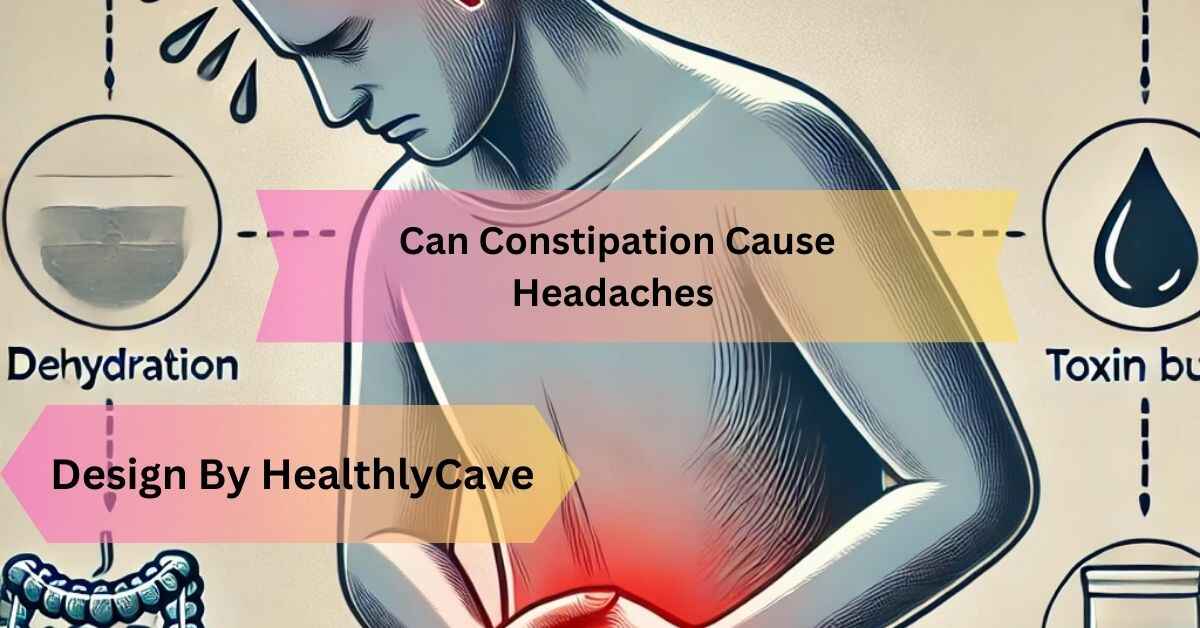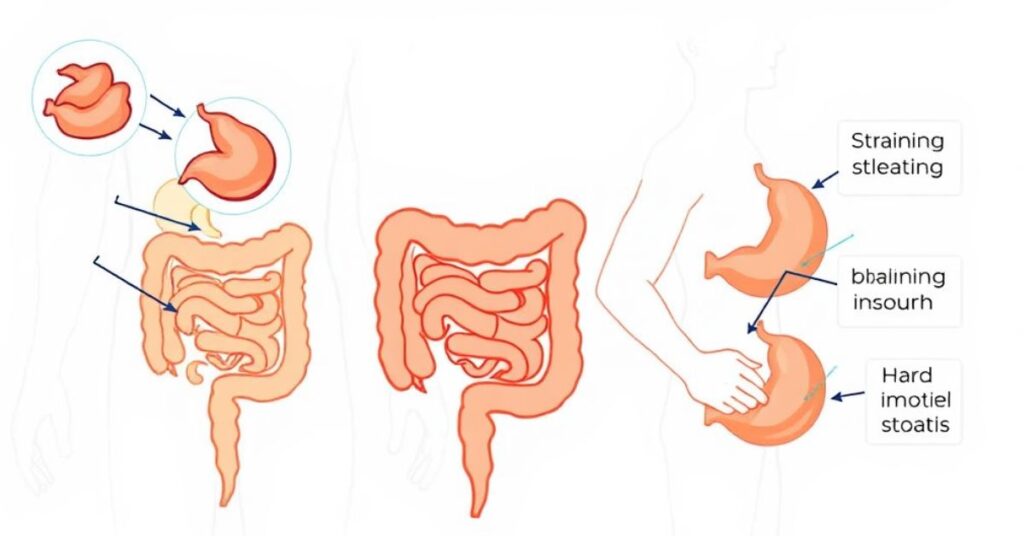
07 Feb Can Constipation Cause Headaches – Causes and Solutions!
Can Constipation Cause Headaches is a issue that many people experience at some point in their lives. But did you know that constipation might not only affect your bowel movements but could also trigger headaches? If you suffer from both constipation and frequent headaches, understanding how they might be related can help you find relief. In this article, we’ll explore the connection between constipation and headaches, how one can lead to the other, and practical steps you can take to improve both conditions. Many people wonder about the link between headache and constipation, and how digestive problems might influence head pain.
What is Constipation?

Before understanding how constipation affects other parts of your body, it’s essential to know what constipation is. Constipation refers to the difficulty in passing stools or infrequent bowel movements. While the definition varies slightly depending on the source, it is generally defined as having fewer than three bowel movements a week. Common signs of constipation include:
- Straining during bowel movements
- Passing hard or lumpy stools
- A feeling of incomplete emptying after a bowel movement
- Abdominal discomfort, bloating, and cramping
- Reduced frequency of bowel movements, often lasting more than a few days
In some cases, constipation can be caused by poor diet, lack of physical activity, dehydration, certain medications, or underlying medical conditions.
Can Constipation Cause Headaches?
Yes, constipation can cause headaches, and there are several reasons why the two might be connected. Though it may seem surprising, the body’s systems are all interconnected, so digestive issues like constipation can have far-reaching effects on your overall well-being, including causing headaches. Here’s how constipation can contribute to headaches. Researchers have also looked into the relationship between constipation and migraines, finding that bowel issues can sometimes trigger neurological symptoms:
1. Dehydration:
Dehydration is one of the leading causes of both constipation and headaches. When you’re constipated, your body often has difficulty absorbing the necessary water to keep your stools soft and easy to pass. This leads to dehydration, which can trigger headaches. A lack of hydration affects brain function and can cause it to shrink slightly, resulting in tension and pain in the head. Moreover, dehydration reduces the amount of blood circulating to the brain, which can contribute to headaches. So, if you’ve ever asked yourself, ‘does constipation cause headaches?’ dehydration could be one of the answers.
2. Toxin Buildup in the Body:
Constipation often leads to a buildup of waste products and toxins in the colon. When the body’s waste isn’t being expelled efficiently, these toxins can be reabsorbed into the bloodstream. This toxin buildup can trigger inflammation, contributing to headache symptoms. Essentially, when the colon doesn’t eliminate waste properly, it can make you feel sluggish, fatigued, and cause headaches as a result. This toxic overload may explain why migraines and constipation often appear together in sensitive individuals.
3. Increased Pressure from Straining:
When you’re constipated, you may have to strain to pass stools. This act of straining increases pressure in the abdominal and head area, which can lead to tension headaches or even migraines. The increased pressure may affect the blood vessels in your head, leading to the onset of a headache. The strain may result in a headache due to constipation that feels like pressure in the head or temples
4. Stress and Anxiety:
The discomfort caused by constipation can create stress and anxiety. These emotional responses can trigger headaches, especially tension headaches. When you’re dealing with the frustration of constipation, the added mental strain can exacerbate the situation, contributing to both physical and emotional distress. Stress can worsen digestive issues, which in turn may link to migraine and constipation episodes happening at the same time
5. Poor Sleep Patterns:
Constipation can also interfere with your sleep. The discomfort and bloating that accompany constipation may make it difficult to rest well at night, leading to tiredness and, over time, headaches. Poor sleep quality is a well-known headache trigger and can exacerbate the effects of constipation on your body.
READ MORE: Can High Cholesterol Cause Headaches – Find Out Now!
How Can You Relieve Headaches Caused by Constipation?
The good news is that you can reduce the frequency of headaches by treating constipation and improving your digestive health. Here are some practical ways to help relieve constipation and prevent headaches:
1. Drink Plenty of Water:
Adequate hydration is crucial in preventing both constipation and dehydration-related headaches. Water helps soften stools, making them easier to pass, while also keeping your brain well-hydrated and functioning properly. Aim for at least 8 glasses of water a day or more if you are particularly active or living in a hot climate.
2. Increase Fiber Intake:
A fiber-rich diet can help alleviate constipation by softening stools and promoting regular bowel movements. High-fiber foods include fruits, vegetables, whole grains, beans, and legumes. Fiber helps move food through the digestive tract efficiently, reducing the likelihood of constipation and, by extension, preventing headaches.
3. Exercise Regularly:
Physical activity stimulates digestion and helps keep your bowel movements regular. Exercise also reduces stress, which can be a headache trigger. Even light activities like walking or yoga can be beneficial in relieving both constipation and headaches. if you’re looking for a safe constipation headache remedy, lifestyle adjustments like hydration and fiber intake are the first step.
4. Consider Laxatives or Stool Softeners:
If you’re struggling with persistent constipation, over-the-counter laxatives or stool softeners may offer relief. However, these should only be used temporarily and with guidance from a healthcare professional, as overuse can lead to dependence or further digestive issues.
5. Manage Stress:
Since stress can contribute to both constipation and headaches, learning to manage stress is key. Try relaxation techniques such as deep breathing, meditation, or mindfulness exercises. Reducing emotional tension can help relieve constipation-related headaches and improve your overall well-being.
When Should You See a Doctor?
While occasional constipation and headaches are normal, frequent or severe symptoms should be addressed with a healthcare professional. If you experience the following, it’s time to seek medical advice:
- Persistent or chronic constipation that lasts for weeks
- Severe or worsening headaches that don’t respond to treatment
- Abdominal pain or bloating that is not relieved by typical remedies
- Sudden changes in your bowel habits or the presence of blood in your stool
A doctor can help determine if there’s an underlying medical condition causing both your constipation and headaches and provide targeted treatments to address them.
FAQs:
1. Can constipation cause migraines?
Yes, constipation can trigger migraines in some people, especially when it’s associated with dehydration, stress, or toxin buildup in the body. Migraines are often sensitive to multiple triggers, and constipation can be one of them.
2. How long can constipation last before causing headaches?
Constipation can cause headaches after several days or even weeks of infrequent or difficult bowel movements. The longer you experience constipation, the greater the chances of it affecting other parts of your body, including your head.
3. Can I prevent headaches caused by constipation?
Yes, by staying hydrated, eating a fiber-rich diet, exercising regularly, and managing stress, you can significantly reduce the chances of experiencing headaches triggered by constipation. Regular bowel movements are key to preventing the buildup of toxins and discomfort.
4. What foods should I avoid if I have constipation and headaches?
Foods that are high in fat, processed sugars, or low in fiber can worsen constipation. Similarly, caffeine and alcohol can dehydrate the body and potentially trigger headaches. It’s best to avoid or limit these foods while managing both constipation and headaches.
5.Can constipation cause pressure in head?
Yes, constipation can sometimes lead to a sensation of pressure in the head due to straining, toxin buildup, or dehydration.
Conclusion:
Constipation and headaches can be more connected than you might think. From dehydration to toxin buildup and physical strain, there are several ways that constipation can contribute to headache pain. By improving your hydration, diet, exercise routine, and stress levels, you can alleviate both your constipation and the headaches that often come with it.
Taking proactive steps to relieve constipation may result in better overall health and fewer headaches. However, if symptoms persist, it’s important to consult with a healthcare professional to address any potential underlying issues.

No Comments